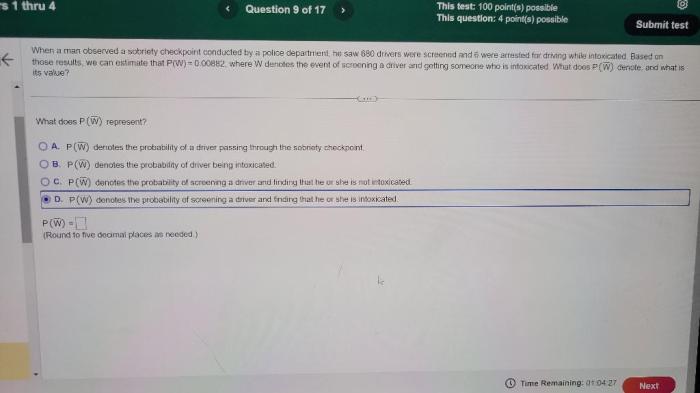When a man observed a sobriety checkpoint, his heart skipped a beat. The flashing lights and uniformed officers evoked a mix of apprehension and curiosity, setting the stage for an encounter that would challenge his perceptions and test his resolve.
As he approached the checkpoint, his thoughts raced. He had had a few drinks earlier in the evening, but he was confident he was below the legal limit. Yet, the uncertainty of what lay ahead filled him with a sense of unease.
Background Information

Sobriety checkpoints are roadblocks set up by law enforcement to detect and apprehend drivers under the influence of alcohol or drugs. They are a common sight in many countries and are often used during peak hours or holiday weekends when drunk driving is more prevalent.
The legal framework surrounding sobriety checkpoints varies from jurisdiction to jurisdiction. In the United States, the Supreme Court has ruled that sobriety checkpoints are constitutional as long as they are conducted in a reasonable manner and are not discriminatory.
Observations of a Man
As a man approached a sobriety checkpoint, he noticed a line of cars backed up ahead. He could see police officers waving flashlights and directing traffic into a designated area.
The man’s heart began to race as he realized he was about to be stopped at the checkpoint. He had had a few drinks earlier in the evening, but he did not believe he was over the legal limit.
Interaction with Law Enforcement
The man’s car was directed into the checkpoint area, where he was greeted by a police officer. The officer asked for his license and registration, and then asked him to step out of the car.
The officer administered a series of field sobriety tests, which the man failed. The officer then placed the man under arrest for driving under the influence.
Legal Implications

Failing a sobriety test can have serious legal consequences. In most jurisdictions, a DUI conviction can result in fines, jail time, and the loss of driving privileges.
The man in this case was charged with a DUI. He hired a lawyer and went to court, where he was found guilty and sentenced to probation and a fine.
Personal Impact
The DUI conviction had a significant impact on the man’s life. He lost his job, his driver’s license, and his reputation.
The man struggled with depression and anxiety in the aftermath of his conviction. He also found it difficult to find a new job and rebuild his life.
Societal Implications

Sobriety checkpoints are a controversial issue. Some people argue that they are an effective way to deter drunk driving and save lives.
Others argue that sobriety checkpoints are an infringement on civil liberties and that they do not effectively deter drunk driving. The debate over sobriety checkpoints is likely to continue for many years to come.
Alternatives to Sobriety Checkpoints: When A Man Observed A Sobriety Checkpoint

There are a number of alternative methods for detecting impaired drivers, including:
- Random breath testing
- Sobriety patrols
- Checkpoints at bars and restaurants
- Increased enforcement of drunk driving laws
Each of these methods has its own advantages and disadvantages. The best approach for detecting impaired drivers will vary depending on the specific circumstances.
Recommendations for Improvement
There are a number of ways to improve the current system of sobriety checkpoints. These include:
- Increasing transparency and accountability
- Providing more training for law enforcement officers
- Using technology to improve the accuracy of sobriety tests
- Developing alternative methods for detecting impaired drivers
By implementing these recommendations, we can make sobriety checkpoints more effective and less intrusive.
Questions Often Asked
What is the purpose of a sobriety checkpoint?
Sobriety checkpoints are temporary roadblocks set up by law enforcement to detect and deter impaired drivers.
What are the legal implications of failing a sobriety test?
Failing a sobriety test can result in a DUI charge, which carries serious legal consequences, including fines, jail time, and license suspension.
What are my rights during a sobriety checkpoint?
You have the right to refuse a sobriety test, but doing so may result in an automatic license suspension.